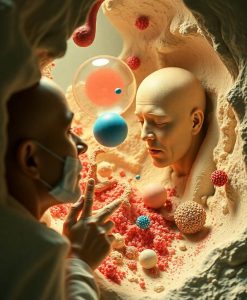Imagine the subtle hum of your body’s inner landscape—the tiny signals your tissues send when they’re trying to heal, the faint tug of discomfort that hints at something needing attention. It’s as if your body is whispering, “I need help,” but often, we miss these quiet cues until the pain or dysfunction becomes loud enough to notice.
Now, consider how groundbreaking advances in stem cell research are beginning to turn this gentle whisper into a hopeful conversation. Stem cell therapy, a frontier of regenerative medicine, holds the potential to restore what’s been lost—whether it’s a damaged heart, a neurological injury, or a stubborn joint problem. It’s like giving your body the raw materials to rebuild itself, piece by delicate piece, in a way that respects its natural capacity for renewal.
But what does this mean for those of us living with chronic conditions or ongoing injuries? And how close are we to seeing these treatments become a part of everyday healthcare? These questions are at the heart of what stem cell science promises—and what it still needs to clarify.
### How Stem Cell Therapy Might Help Your Body Heal
The idea of using stem cells to repair damaged tissues isn’t new, but it’s only recently beginning to show real promise. For people experiencing cardiovascular issues, the prospect of regenerating heart tissue could mean a future where a heart attack isn’t the end of the road but a chapter in healing. For those with neurological disorders—like Parkinson’s or spinal injuries—the hope is that stem cells might nurture new growth, reconnect broken pathways, and restore movement or function.
Even in orthopedics, where injuries to cartilage or tendons can linger for years, stem cells could act as a natural reset button, encouraging your body to repair itself rather than relying solely on surgical interventions or medications.
This emerging science isn’t just about fixing what’s broken; it’s about opening a new pathway to health that aligns with your body’s innate capacity to recover. It’s a shift from simply managing symptoms to fostering genuine regeneration—something that many of us can intuitively sense when we reflect on our own bodies’ remarkable ability to heal given the right environment.
### The Journey from Promise to Practice
While early studies and trials are promising, the science is still in its infancy. Many treatments are experimental, and researchers are carefully navigating the complex landscape of safety and efficacy. For those living with chronic pain or degenerative conditions, this means staying hopeful but also patient, recognizing that real change takes time, rigorous testing, and thoughtful application.
In this landscape, it’s vital to listen to your body’s signals, seek guidance from qualified healthcare providers, and stay informed about new developments. The future of stem cell therapy hinges on ongoing research, but its potential to transform lives is already palpable—like a gentle tide rising, promising a new chapter of health and renewal.

### Embracing the Unfolding Future
As we stand at this exciting crossroads of medicine, the question isn’t just about what stem cells can do tomorrow, but how they can help us tune into our bodies’ natural rhythms of healing today. It’s about nurturing hope, understanding that science is a journey—sometimes slow, sometimes surprising—but always moving toward more compassionate, personalized care.
If you’re living with a condition that feels like a persistent whisper of discomfort or limitation, know that the horizon is expanding. The future of medicine may soon offer tools that work with your body’s own regenerative power—helping you listen more closely to what your body needs and supporting its innate capacity to heal.
Learn More: Dr. Crandall: Stem Cells and the Future of Medicine
Abstract: Stem cell therapy is a cutting-edge treatment that holds promise for alleviating a variety of conditions, including cardiovascular diseases, neurological disorders and orthopedic injuries. While some preliminary studies using stem cells are showing promise, it is still…
Link: Read Full Article (External Site)


